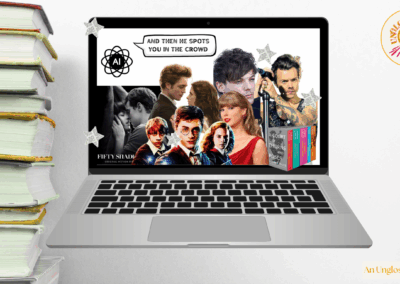As book lovers strain to keep up with BookTok’s colossal reading goals, how does speed becoming a books’ main selling point kill our enjoyment of reading?
Can you read 74 books in one month?
When Sarah Merrigan, 26, realised she was miles behind her lofty book goal for the year, she was undaunted. “I got to 128 in November and thought ‘I have to get to 200 somehow’, so I set myself this insane challenge.”
‘I have to read two books, every day, for a month’, she told her TikTok followers.
Ready, set, go!



Audiobooks covered her 7am commute, a kindle helped her speed through lunch breaks, and she didn’t let her eyelids drop until 300 pages were demolished that evening. One eye on the book, the other on the clock, “I wasn’t being social because I was just reading all the time rather than meeting friends or family.” As the deadline crept closer, stealth as reading fatigue, every scrap of spare time was spent in another world.
The first week was a success.
The second, a stumble.
The third, prioritising whatever piled up at the door back to reality.
By the end of December, she’d managed 37 books – her personal best – but felt disappointed for not crossing the ultimate finish line, “I gave up and got really burnt out. It was hard to accept that I failed.”
Reading goals that started as a motivator to not scroll yourself into the next day are now influencing readers to crave closing a book more than lingering snug within the storyline.
Viral videos showcasing ‘how many books I read’ in a week, month and year have dominated BookTok – a platform now amounting 370 billion views and steering the tide of book sales.
Sarah says, “Initially, BookTok set out to have a really nice open community that was fun for people to chat about the books they enjoy. But, in the last year it’s changed and gotten a lot more competitive. You are definitely seen as better at reading if you read more volume-wise.”
She found these ‘insane’ reading challenges steal your enjoyment by luring you into a ‘book slump’ – a BookTok phrase to define your period of not-reading with an explanation, an excuse. A diagnosis. “When you’re reading, you see it like a movie in your mind and time goes by so fast. It’s the best feeling ever. But then you get to this point where the movie stops, and you can’t get back to that feeling. Reading a sentence just becomes words on a page. Even though the writing is good, or the story is really interesting, you just cannot connect with it. I’m in one now and really struggling to enjoy reading again.”
To keep up with the increasing pace of reading, people are surrendering themselves as one might to marathon training rather than a morning jog – set on a diet of simplistic, predictable plots under 200 pages: the protein bars of reading, if you will. During hers, Sarah had no time for that meaty series she’d been longing to sink her teeth into, “People will just recommend books you’ll get through fast, and I found myself reading ones that wouldn’t challenge me, just so I could tick them off.”
Another BookTok creator, Ashli Hughes, noticed a bigger problem with these quantitative trends, “People binging these kinds of series to hit 100 books impacts what the publishing world thinks we want. You see ‘BookTok must-haves’ on tables in Waterstones and it’s the more digestible books that people can read within three to four hours that are getting popular, and then within six weeks a sequel is being announced.
“I think even if you’re an older reader or someone who’s not on social media, you can’t deny the impact that BookTok trends are having on reading as a whole.”
Clara Juncker, with a master in publishing and PhD on contemporary bestsellers, believes book releases are sprinting to keep up with competitive readers. She says, “It’s all about following trends. By the time you publish the book, the trend is pretty much gone and that’s why sequels are being published so quickly after the first one, but then the quality gets lower as more typos are missed in books. Sometimes it feels like you’re reading a first draft.
“It’s not impatience that has changed, but attention spans – because if you’re not quick enough, they’re going to have jumped on something else and lost interest.”
To feed these reading races, easy plots are being recycled, recommendations revolve around speed, and the pool of books available to the public narrows.
A reader used to be anyone with a book lying on their lap as you walked by, but now, with followers keeping tabs on exactly how committed you are, comparison spurs you on. Goodreads currently has 33,890 people tracking a 2025 reading goal. Ashli admits, “I’m hyperactive with how I track my reading because it’s really satisfying when you get a goodreads notification that says you’re 10 books ahead. It gives me a little ego boost and sense of achievement.”
She lowered her goal for the first time this year, but says the high expectations are still hard to escape, “I first started reading 100 books a year as a university student. As I got older, I had less time and different responsibilities, so it turned into this really toxic pressure of thinking, ‘my god, I’m behind. I haven’t read today, and I really need to’. It became less about actually enjoying reading and more a panic because I’m falling behind.
“I was just scrolling on TikTok and saw ‘how much I read in an hour as a fast reader’, ‘am I on track with my goals?’, and someone who finished their 100-book reading goal. I had that initial panic that they’re a better reader than I am, they’re reading faster and I’m not doing enough.
“It’s a status thing. I think the original intention was motivation, but people have skewered that into ‘this is how you prove that you’re a real reader’.”
Clara says, “Loads of people are buying the same book but in different editions and covers. It looks good on Instagram because you can show you’re a huge fan of the book, but it crowds the market. Instead of having a debut author, the same book published three years ago will take up space on the shelves.
“Now, publishers are sending review copies to ‘bookstagrammers’ who are happy to feel important enough to receive a book in advance. But they don’t tend to leave negative reviews because they won’t get many books afterwards, so it’s not that genuine. It feels like they’re using normal people for free marketing.”
Sarah stresses this desire for more is merely aspirational, “I get jealous of book hauls and want to have my own library and get to the level of really big BookTokers like Jack Edwards, who are almost professional readers.”
Since society has always defined reading as prestigious and intellectual, it is no wonder readers are clawing for credit at a time everyone is painted into screen-addicted zombies. But this content shift to defining how much a person enjoys reading with physical proof is snatching long-form, meticulous literature from our hands. It may seem like the more you read, the more you belong, but enjoyment trails behind, panting.










